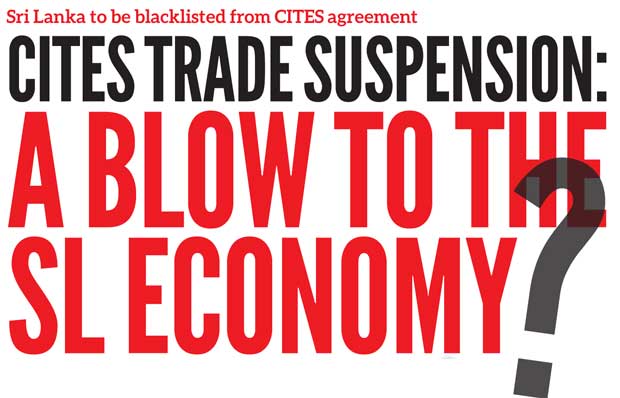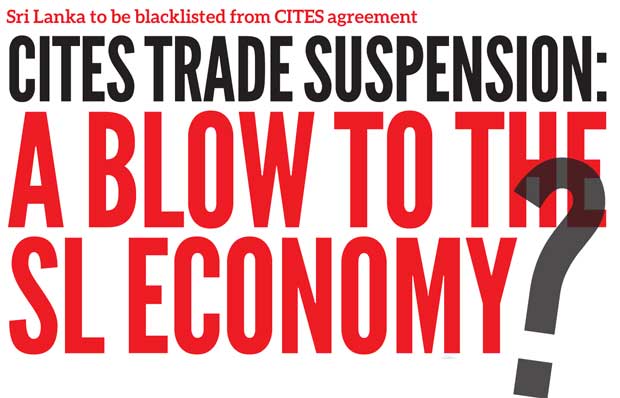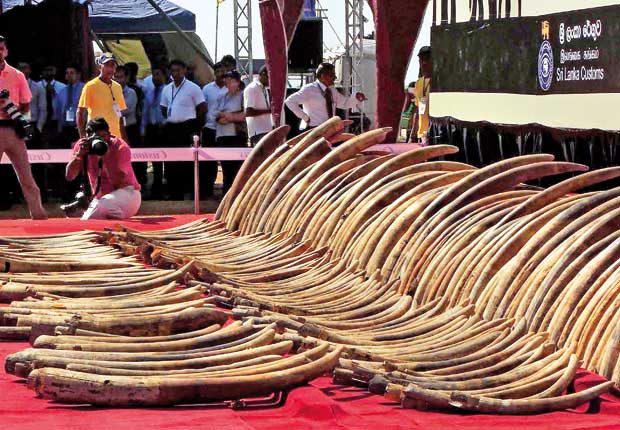
CITES trade suspension: A blow to the SL economy

The Convention on International Trade in Endangered Species of Wild Fauna and Flora, globally known as CITES, is an international treaty which has been signed among governments to ensure that international trade in specimens of wild animals and plants does not threaten their survival. Sri Lanka has been party to this agreement for over 20 years but the poorly structured national legislation has confined Sri Lanka to ‘Category 3’.
In a Notification document which was drafted earlier this year, it was stated that Sri Lanka was still a Category 3 Party due to poor national legislation to implement CITES which in other words mean that Sri Lanka doesn’t have the necessary legislation but has been Party to the Convention for more than twenty years as of March 2013. Therefore Sri Lanka would face “a suspension of commercial trade in specimens of CITES-listed species”. Upon being blacklisted by this specific convention, Sri Lanka will be deprived of its GSP Plus concession as well.
Is it really a matter of legislation? How far should domestic legislation reach? How can this suspension be overcome? In order to shed light on these issues, the Daily Mirror spoke to a few individuals of expertise:

“Domestic legislation doesn’t address international trade adequately”
Manori GunawardenaCountry representative to the Born Free Foundation, Manori Gunawardena said that Sri Lanka has been a signatory to CITES since 1978, thereby demonstrating a strong commitment to the protection of species endangered by international commercial trade. “Sri Lanka’s national legislation is strong on conserving listed species from exploitation and is committed to protecting its natural assets within its borders. However, while domestic legislation serves to enforce infractions locally, it does not address international trade adequately.”
“Being part of a major trade route, recent detections of wildlife contraband of both native and non-native species have come to light. The detection of the large African ivory shipment, the regular confiscation of “agar wood” (“walla patta”, a native tree), and the reported online sale of endemic Sri Lankan lizards in Europe all indicate persuasive arguments to supplement the country’s domestic legislation with the provisions of CITES, a treaty to which 182 sovereign countries are signatory. Sri Lanka has taken a proactive stance in combating the illegal trade in wildlife and at the upcoming CITES meeting has co–proposed improved protection for the African elephant, Indian pangolin, mobular ray and silky and thresher shark.”
Prof. Sirimal Abeyratne“Sri Lanka shouldn’t depend on these types of concessions”
Speaking to the , Prof. of Economics Sirimal Abeyratne said that having no legislation for an issue like this is also a weakness. “The GSP Plus concession is mainly benefiting exporters because it helps them to maintain their competitiveness. But the major concern here is that these concessions should only be used temporarily. When a country is developing and has established its export market, it shouldn’t depend on these types of concessions. Such a country should compete through quality and prices.”
“The legislation will be gazetted soon” R.M.D.B Meegasmulla
Speaking to the Daily Mirror, Ministry of Sustainable Development and Wildlife secretary R.M.D.B. Meegasmulla said there was still some time remaining to get the clearance. “The Attorney General’s department has given us a clearance on this regard and we will be gazetting the legislation. We still have time till September and so far we haven’t been given a notice saying that we will be blacklisted. There were a few delays but we will recover them soon.”
“If we are black-listed it will affect our economy” Samantha Gunasekara
Speaking to the , ex-Deputy Director of Customs, Samantha Gunasekara said that for the import or the export of any species, the CITES is not a legal permit. “We first need to have the national legislation. There are 47 countries who are on the verge of getting black-listed by the CITES due to lack of proper legislation. Exotic and aquamarine species like sea horses have been listed as protected under the CITES agreement. We have signed it as facilitation but many other countries have engaged in illegal wildlife trade although they are party to the convention. If Sri Lanka gets blacklisted, it will affect our economy and the GSP Plus scheme will be removed from the country.”
“DWC has not communicated with us” CITES Secretariat
The CITES Secretariat when contacted, said “The CITES management authority in Sri Lanka, the Department of Wildlife has to date not communicated progress on national legislation to the Secretariat.”
“We are equipped with the necessary legislation” Jagath Gunawardena
Speaking to the , Environmental lawyer and Attorney-at-law Jagath Gunawardena said that in terms of legislation we have gone beyond the CITES agreement. “For example the Flora and Fauna Protection Ordinance (FFPO) Section 37 and Section 40 clearly state that the export of wild animals is illegal. But we have imposed zero tolerance on the export of wild animals or any for trade purposes. Also according to the document it is clearly visible that Sri Lanka is not alone in getting suspended. There are certain matters that need to be taken in to consideration. One is the fact that we have the proper legislation. Second is that the CITES requires a scientific body and under Section 35 of the FFPO we have many of them including Zoological Gardens. Then there should be an enforcement authority and we have the Customs department for that. Both section 40 which speaks about exports and section 35 which speaks about imports empower the Customs department to deal with such transactions as it’s an offence under the Customs Ordinance. As such these particular areas are covered. Then back in 2007 Prof. G. L. Pieris, who was the then Foreign Minister wanted compliance with the CITES for the GSP Plus. There was a committee to look in to the GSP Plus compliance and CITES was one of the requirements. The provisions in the FFPO were sufficient for the EU and therefore they granted us the GSP Plus concession.”
Stressing further on this regard, Mr. Gunawardena said that CITES is a trade convention and that it provides a way for trade. “Back in 1995 this convention downgraded the protected status of corals to Appendix 2. But in the FFPO all corals are a totally protected species and therefore we were able to circumvent any adverse situation. On the other hand, certain countries have openly violated the CITES convention when it comes to the illegal trade of ivory for example, but the CITES has not taken any action against them. Therefore we can be a party to the CITES but they can’t do anything detrimental to our position. What should be done at the moment is that someone should show the CITES that we are equipped with the proper legislation. But on the other hand there are certain species that should be protected under the CITES which we have failed to do. For example marine organisms like the manta ray and sea horse which comes under the purview of the Fisheries ministry should be protected. The Aquatic Resources Department is quite slow and they should gear themselves to work more effectively, when it comes to priorities and enacting legislations.”



